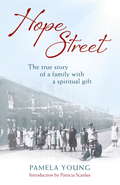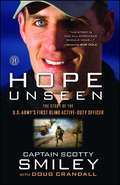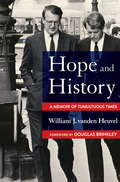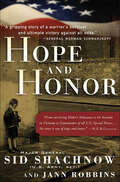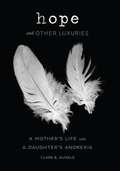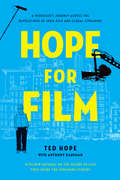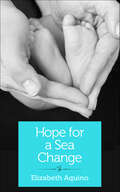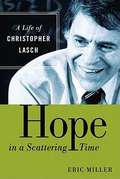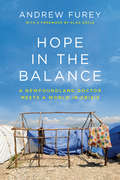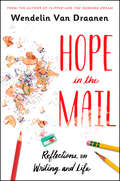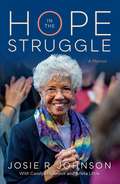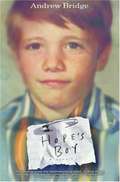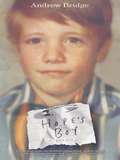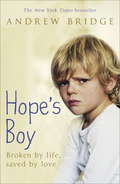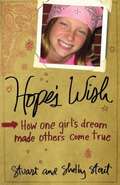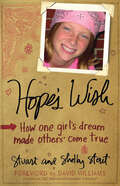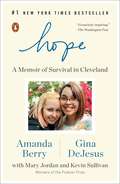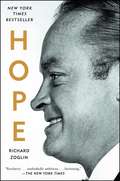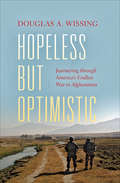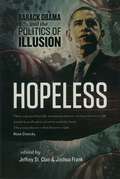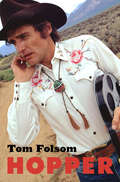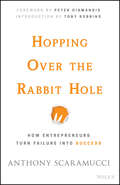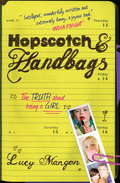- Table View
- List View
Hope Street: The triumphs and tragedies of a family with a spiritual gift
by Pamela YoungThis is the story of a family which has always lived in the heart of one of the traditional working class communities of the North. Originally immigrants from Ireland in the mid-nineteenth century, their saga, their triumphs and tragedies unfolded in the cobbled streets, working men's cottages and terraced houses of Horwich, near Manchester. They worked in the cotton mills and on the railways. Like most families at the time, they were good socialists and trade unionists. They also attended the local Spiritualist church. Spiritualism was free-thinking, modern and progressive too and went hand in hand with socialism. The family living on Hope Street North had problems every family has - and worse. Marriages broke up and they had more than their fair share of loss and heartbreak. Within the working class in those days there were many - now forgotten - class distinctions which caused painful rifts between the family. There was a violent bully too and an eviction which left a mother and her children wandering the streets penniless and homeless. A young girl was run over and killed by a horse and cart and another died of diptheria. An unmarried woman bound her abdomen tightly to disguise her pregnancy, and as a result her child was born with deformed legs. As a young woman, that child went on to elope with her lover and they both committed suicide. She died as she was born: in shame. The book that would become Hope Street started when Pamela Young felt compelled to write about her mother's childhood, of seeing things - spirits, angels - that other people couldn't see. Vivid memories of their family life came flooding back: coal dusk glistening on her father's scalp as he came home from work, the old army coats used as bedding and the dresser with doors missing because they'd been chopped up as firewood when times were hard. And swirling in and around these very vivid, often earthy memories of life in Hope Street were memories of the extraordinary spiritual phenomena that took place there. On one occasion a silver ball sped around the room. On another her father, asking for proof, was picked up by a spirit guide and lifted up into the air as light as a feather. Pamela would once see her mother engulfed in a cloud of ectoplasm and twice her mother gradually, and starting from her head down, disappeared before her eyes. But it was after her own marriage had broken up and her mother had died, when Pamela was in the depths of despair, that she found her own spiritual gift. Guided by the spirit of her mother, she began to fully understand the great project her mother had initiated.
Hope Street: The triumphs and tragedies of a family with a spiritual gift
by Pamela YoungThis is the story of a family which has always lived in the heart of one of the traditional working class communities of the North. Originally immigrants from Ireland in the mid-nineteenth century, their saga, their triumphs and tragedies unfolded in the cobbled streets, working men's cottages and terraced houses of Horwich, near Manchester. They worked in the cotton mills and on the railways. Like most families at the time, they were good socialists and trade unionists. They also attended the local Spiritualist church. Spiritualism was free-thinking, modern and progressive too and went hand in hand with socialism. The family living on Hope Street North had problems every family has - and worse. Marriages broke up and they had more than their fair share of loss and heartbreak. Within the working class in those days there were many - now forgotten - class distinctions which caused painful rifts between the family. There was a violent bully too and an eviction which left a mother and her children wandering the streets penniless and homeless. A young girl was run over and killed by a horse and cart and another died of diptheria. An unmarried woman bound her abdomen tightly to disguise her pregnancy, and as a result her child was born with deformed legs. As a young woman, that child went on to elope with her lover and they both committed suicide. She died as she was born: in shame. The book that would become Hope Street started when Pamela Young felt compelled to write about her mother's childhood, of seeing things - spirits, angels - that other people couldn't see. Vivid memories of their family life came flooding back: coal dusk glistening on her father's scalp as he came home from work, the old army coats used as bedding and the dresser with doors missing because they'd been chopped up as firewood when times were hard. And swirling in and around these very vivid, often earthy memories of life in Hope Street were memories of the extraordinary spiritual phenomena that took place there. On one occasion a silver ball sped around the room. On another her father, asking for proof, was picked up by a spirit guide and lifted up into the air as light as a feather. Pamela would once see her mother engulfed in a cloud of ectoplasm and twice her mother gradually, and starting from her head down, disappeared before her eyes. But it was after her own marriage had broken up and her mother had died, when Pamela was in the depths of despair, that she found her own spiritual gift. Guided by the spirit of her mother, she began to fully understand the great project her mother had initiated.
Hope Unseen: The Story of the U.S. Army's First Blind Active-Duty Officer
by Doug Crandall Cap. Scotty SmileyThe inspiring, unflinching true story of &“blind&” faith, as Major Scotty Smiley awakes in a hospital bed and realizes his world is permanently dark he must stretch his faith like never before. Courageous, heartfelt, and honest, Hope Unseen challenges readers to question their doubts, not their beliefs, and depend upon God no matter what.A nervous glance from a man in a parked car. Muted instincts from a soldier on patrol. Violent destruction followed by total darkness. Two weeks later, Scotty Smiley woke up in Walter Reed Army Medical Center, helpless . . . and blind. Blindness became Scotty&’s journey of supreme testing. As he lay helpless in the hospital, Captain Smiley resented the theft of his dreams—becoming a CEO, a Delta Force operator, or a four-star general. With his wife Tiffany&’s love and the support of his family and friends, Scotty was transformed—the injury only intensifying his indomitable spirit. Since the moment he jumped out of a hospital bed and forced his way through nurses and cords to take a simple shower, Captain Scotty Smiley has climbed Mount Rainier, won an ESPY as Best Outdoor Athlete, surfed, skydived, become a father, earned an MBA from Duke, taught leadership at West Point, commanded an army company, and won the MacArthur Leadership Award. Scotty and Tiffany Smiley have lived out a faith so real that it will inspire you to question your own doubts, push you to serve something bigger than yourself, and encourage you to cling to a Hope Unseen.
Hope and History: A Memoir of Tumultuous Times
by William J. vanden HeuvelHope and History is both a memoir and a call-to-action for the renewal of faith in democracy and America. US Ambassador William J. vanden Heuvel presents his most important public speeches and writings, compiled and presented over eight decades of adventure and public service, woven together with anecdotes of his colorful life as a second-generation American, a soldier, a lawyer, a political activist, and a diplomat. He touches upon themes that resonate as much today as they did when he first encountered them: the impact of heroes and mentors; the tragedy of the Vietnam War; the problems of racism and desegregation in America; tackling the crisis in America's prisons; America and the Holocaust; and the plight and promise of the United Nations. Along the way, he allows us to share his journey with some of the great characters of American history: Eleanor Roosevelt, William J. "Wild Bill" Donovan, President John F. Kennedy and RFK, Harry S. Truman, and Jimmy Carter.Throughout, vanden Heuvel persuades us that there is still room for optimism in public life. He shows how individuals, himself among them, have tackled some of America's most intractable domestic and foreign policy issues with ingenuity and goodwill, particularly under the leadership of President Franklin D. Roosevelt and those who sought and still seek to follow in his footsteps. He is not afraid to challenge the hatred and bigotry that are an unfortunate but undeniable part of the American fabric. He exhorts us to embrace all the challenges and opportunities that life in the United States can offer.
Hope and Honor: A Memoir Of A Soldier's Courage And Survival
by Jann Robbins Sid ShachnowHope and Honor is a powerful and dramatic memoir that shows how the will to live—so painfully refined in the fires of that long-ago death camp—was forged, at last, into truth of soul and wisdom of the heart. Major General Sid Shachnow was more than a highly decorated Vietnam War veteran—receiving two silver and three bronze stars with V for Valor. He survived a crucible far crueler than the jungles of Vietnam: Nazi occupied Eastern Europe. As a child, he spent three years in the notorious Kovno Concentration Camp. But his next journey took him to America, where he worked his way through school and eventually enlisted in the US Army. He volunteered for U.S. Special Forces, and served proudly for 32 years. His driving dream was to save others from the indignities he had endured and the deadly fate he so narrowly escaped. From Vietnam to the Mideast, to the fall of the Berlin Wall, Sid Shachow served in Special Operations. He grew as Special Forces grew, rising to major-general—responsible for American Special Forces everywhere—but the lessons of Kovno stayed with him, wherever he turned, wherever he soldiered. At the Publisher's request, this title is being sold without Digital Rights Management Software (DRM) applied.
Hope and Other Luxuries
by Clare B. DunkleClare Dunkle seemed to have an ideal life--two beautiful, high-achieving teenage daughters, a loving husband, and a satisfying and successful career as a children's book novelist. But it's when you let down your guard that the ax falls. Just after one daughter successfully conquered her depression, another daughter developed a life-threatening eating disorder. Co-published with Elena Vanishing, the memoir of her daughter, this is the story--told in brave, beautifully written, and unflinchingly honest prose--of one family's fight against a deadly disease, from an often ignored but important perspective: the mother of the anorexic.
Hope for Film: From the Frontline of the Independent Cinema Revolutions
by Ted HopeAn inspiring, tell-all look at the indie film business from one of the industry's most passionate producers, Hope for Film captures the rebellious punk spirit of the indie film boom in 1990s New York City, its collapse two decades later and its current moment of technology-fueled regeneration. Ted Hope, whose films have garnered 12 Oscar nominations, draws from his own personal experiences working on the early films of Ang Lee, Eddie Burns, Hal Hartley, Michel Gondry, Nicole Holofcener, Todd Solondz and other indie mavericks, relating those decisions that brought him success as well as the occasional failure.Whether navigating negotiations with Harvey Weinstein over final cuts or clashing with high-powered CAA agents over their clients, Hope offers behind-the-scenes stories from the wild and often heated world of low-budget cinema-where art and commerce collide. As mediator between these two opposing interests, Hope offers his unique perspective on how to make movies while keeping your integrity intact and how to create a sustainable business enterprise out of that art while staying true to yourself. Against a backdrop of seismic changes in the indie-film industry, from corporate co-option to the rise of social media, Hope for Film provides not only an entertaining and intimate ride through the ups and downs of the business of art-house movies over the last 25 years, but also hope for its future.
Hope for a Sea Change: A Search for Healing
by Elizabeth AquinoWhen her three-month-old daughter Sophie is diagnosed with a rare seizure disorder, Elizabeth Aquino and her husband, Michael, are thrust into a nightmarish world of impossible decisions, toxic drug cocktails, and talk of brain surgery on their tiny child. As they grapple with the harrowing progression of their child’s seizures, they grow to understand that the doctors know little more about how to heal Sophie than they do. They are in a terrifying no-man’s-land. This narrative of unintended medical trauma and the search for healing through alternative means will sear you with its stubborn hope, unexpected grace, and abiding love.
Hope in a Scattering Time: A Life of Christopher Lasch
by Eric MillerChristopher Lasch was a leading intellectual of the twentieth century. His work consistently probed the nations political and cultural terrain, considering the unruly thrust of Americas history and the possibilities of a better way. Hope in a Scattering Time is the first and only full biography of this towering intellectual figure. Miller plumbed Lasch's published writings, his correspondence, and interviews and correspondence with his friends, students, and colleagues to create this comprehensive biography. In these pages Eric Miller captures the evolving nature of Lasch's understanding of the world and his fight for clarity and insight in a muddled age. Christopher Lasch's sharp, prophetic stance caused many in his time to rethink what they thought they had understood, and to consider the world anew. Fifteen years after Lasch's death, the time is ripe to once again follow his lead and to reassess how we view and understand our world.
Hope in the Balance: A Newfoundland Doctor Meets a World in Crisis
by Andrew FureyDr. Andrew Furey, an orthopedic surgeon, was sitting by the fireplace at his home in St John's, Newfoundland and Labrador, watching TV after work, when dreadful images of the aftermath of an earthquake in Haiti burst in on the cosy domestic scene. Human suffering on an epic scale was being documented in real time. Dr. Furey spent a sleepless night, and woke knowing he had to help in some way. In what has been a theme throughout Newfoundland and Labrador's history, he found himself answering the call. Dr. Furey formed a team of three--himself; his wife and pediatric emergency room physician, Dr. Allison Furey; and orthopedic surgeon Will Moores--and together they travelled from to Port-au-Prince, Haiti, where they spent a week volunteering. The challenge seemed overwhelming: a multitude of badly injured victims, horrendous working conditions and overstretched aid agencies. But somehow the trio did not lose hope. Instead, they redoubled their efforts. After returning from that first mission, Dr. Furey founded Team Broken Earth--an expert, unbureaucratic, fleet-footed volunteer task force of physicians, nurses and physiotherapists committed to providing aid in Haiti. The organization has continued to grow, recruiting volunteers from all over Canada. It has carried out many more missions to Port-au-Prince and has expanded its operations to other countries like Bangladesh, Guatemala, Ethiopia and Nicaragua. And its mission has expanded in other ways, with education and training for local medical professionals now at the heart of its endeavour. Dr. Andrew Furey tells the story of Team Broken Earth's founding and remarkable work with vivid immediacy and raw honesty. He shares his doubts and failures and moments of near-despair. He explores how his Newfoundland and Labrador upbringing has informed his efforts abroad. And he reaches an optimistic conclusion that will leave readers inspired to bring about positive change in their own lives.
Hope in the Mail: Reflections on Writing and Life
by Wendelin Van DraanenPart writing guide and part memoir, this inspiring book from the author of Flipped and The Running Dream is like Bird by Bird for YA readers and writers. <p><p> Wendelin Van Draanen didn't grow up wanting to be a writer, but thirty books later, she's convinced that writing saved her life. Or, at least, saved her from a life of bitterness and despair. Writing helped her sort out what she thought and felt and wanted. And digging deep into fictional characters helped her understand the real people in her life better as well. <p> Wendelin shares what she's learned--about writing, life, and what it takes to live the writing life. This book is packed with practical advice on the craft: about how to create characters and plot a story that's exciting to read. But maybe even more helpful is the insight she provides into the persistence, and perseverance, it takes to live a productive, creative life. And she answers the age-old question Where do you get your ideas? by revealing how events in her own life became the seeds of her best-loved novels.Hope in the Mail is a wildly inspirational read for anyone with a story to share.
Hope in the Struggle: A Memoir
by Josie R. Johnson Arleta Little Carolyn HolbrookHow a Black woman from Texas became one of the most well-known civil rights activists in Minnesota, detailing seven remarkable decades of fighting for fairness in voting, housing, education, and employment Why do you continue to work on issues of justice? young Black people ask Josie Johnson today, then, perhaps in the same breath, How do you maintain hope? This book, a lifetime in the making, is Josie&’s answer. A memoir about shouldering the cause of social justice during the darkest hours and brightest moments for civil rights in America—and, specifically, in Minnesota—Hope in the Struggle shines light on the difference one person can make. For Josie Johnson, this has meant making a difference as a Black woman in one of the nation&’s whitest states.Josie&’s story begins in a tight-knit community in Texas, where the unfairness of the segregated South, so antithetical to the values she learned at home, sharpened a sense of justice that guides her to this day. From the age of fourteen, when she went door to door with her father in Houston to campaign against the Poll Tax, to the moment in 2008 when, as a delegate at the Democratic National Convention, she cast her vote for Barack Obama for president, she has been at the forefront of the politics of civil rights. Her memoir offers a close-up picture of what that struggle has entailed, whether working as a community organizer for the Minneapolis Urban League or lobbying for fair housing and employment laws, investigating civil rights abuses or co-chairing the Minnesota delegation to the March on Washington, becoming the first African American to serve on the University of Minnesota&’s Board of Regents or creating the university&’s Office of the Associate Vice President for Academic Affairs with a focus on minority affairs and diversity. An intimate view of civil rights history in the making, Hope in the Struggle is a uniquely inspiring life story for these current dark and divisive times, a testament to how one determined soul can make the world a better place.
Hope's Boy
by Andrew BridgeAutobiography of Andrew Bridge, who at age 7 was torn from his screaming mother's arms and put into foster care, going from one horrific situation to another, until he turned 18.
Hope's Boy
by Andrew BridgeFrom the moment he was born, Andrew Bridge and his mother Hope shared a love so deep that it felt like nothing else mattered. Trapped in desperate poverty and confronted with unthinkable tragedies, all Andrew ever wanted was to be with his mom. But as her mental health steadily declined, and with no one else left to care for him, authorities arrived and tore Andrew from his screaming mother's arms. In that moment, the life he knew came crashing down around him. He was only seven years old. Hope was institutionalized, and Andrew was placed in what would be his devastating reality for the next eleven years--foster care. After surviving one of our country's most notorious children's facilities, Andrew was thrust into a savagely loveless foster family that refused to accept him as one of their own. Deprived of the nurturing he needed, Andrew clung to academics and the kindness of teachers. All the while, he refused to surrender the love he held for his mother in his heart. Ultimately, Andrew earned a scholarship to Wesleyan, went on to Harvard Law School, and became a Fulbright Scholar. Andrew has dedicated his life's work to helping children living in poverty and in the foster care system. He defied the staggering odds set against him, and here in this heartwrenching, brutally honest, and inspirational memoir, he reveals who Hope's boy really is.
Hope's Boy: Broken by life, saved by love
by Andrew BridgeAndrew grew up in the 1970s with his funny, loving but deeply unstable mother. Life with her was totally chaotic. She left him alone in motel rooms at night and took him with her when she went house burgling. But Andrew's mother wasn't bad, she was just lost herself and one thing she did was always tell him she loved him. Gradually, though, the bad times got worse. One day Andrew, aged seven, found his mother in the bathroom in the middle of a breakdown, the walls covered in her pleas for help all written in the blood from the cuts she'd inflicted on herself. He was taken into care and put with a foster family who treated him with loneliness and neglect at best and cruel indifference as standard. This is a groundbreaking story of a childhood destroyed by mental illness. It is also a heartbreaking love story about a mother's legacy of love.
Hope's Boy: Broken by life, saved by love
by Andrew BridgeAndrew grew up in the 1970s with his funny, loving but deeply unstable mother. Life with her was totally chaotic. She left him alone in motel rooms at night and took him with her when she went house burgling. But Andrew's mother wasn't bad, she was just lost herself and one thing she did was always tell him she loved him. Gradually, though, the bad times got worse. One day Andrew, aged seven, found his mother in the bathroom in the middle of a breakdown, the walls covered in her pleas for help all written in the blood from the cuts she'd inflicted on herself. He was taken into care and put with a foster family who treated him with loneliness and neglect at best and cruel indifference as standard. This is a groundbreaking story of a childhood destroyed by mental illness. It is also a heartbreaking love story about a mother's legacy of love.
Hope's Wish: How One Girl's Dream Made Others' Come True
by Stuart Stout Shelby StoutOne courageous girl used her final wish to fulfill the wishes of 155 other children. When Hope Stout was diagnosed with bone cancer, the Stouts prayed for a miracle. The miracle occurred, but not in the way the Stouts expected. Instead this young girl asked for what seemed to be impossible--that one million dollars be raised in a month to fund the wishes of all the children on the Make-A-Wish Foundation's list for Central and Western North Carolina. Shelby and Stuart Stout felt led to write A Legacy of Hope after compiling a journal of the 191 days from Hope's diagnosis to her death. Both parents were with Hope every step of the way on her journey from a healthy preteen to being dependent on crutches to eventually being bedridden. Their heartfelt story includes the times when they were angry and desperate, as well as the times when Hope's humor and spirit shone through.
Hope's Wish: How One Girl's Dream Made Others' Come True
by Stuart Stout Shelby StoutOne courageous girl used her final wish to fulfill the wishes of 155 other children. When Hope Stout was diagnosed with bone cancer, the Stouts prayed for a miracle. The miracle occurred, but not in the way the Stouts expected. Instead this young girl asked for what seemed to be impossible-that one million dollars be raised in a month to fund the wishes of all the children on the Make-A-Wish Foundation's list for Central and Western North Carolina.Shelby and Stuart Stout felt led to write A Legacy of Hope after compiling a journal of the 191 days from Hope's diagnosis to her death. Both parents were with Hope every step of the way on her journey from a healthy preteen to being dependent on crutches to eventually being bedridden. Their heartfelt story includes the times when they were angry and desperate, as well as the times when Hope's humor and spirit shone through.Academy Award winning screen writers Diana Ossana and Larry McMurtry are developing the screenplay for Hope&’s Wish with an expected production date sometime in 2013.
Hope: A Memoir of Survival in Cleveland
by Kevin Sullivan Amanda Berry Mary Jordan Gina DejesusThe #1 New York Times BestsellerA bestselling book that is inspiring the nation: "We have written here about terrible things that we never wanted to think about again . . . Now we want the world to know: we survived, we are free, we love life."Two women kidnapped by infamous Cleveland school-bus driver Ariel Castro share the stories of their abductions, captivity, and dramatic escape On May 6, 2013, Amanda Berry made headlines around the world when she fled a Cleveland home and called 911, saying: "Help me, I'm Amanda Berry. . . . I've been kidnapped, and I've been missing for ten years." A horrifying story rapidly unfolded. Ariel Castro, a local school bus driver, had separately lured Berry, Gina DeJesus, and Michelle Knight to his home, where he kept them chained. In the decade that followed, the three were raped, psychologically abused, and threatened with death. Berry had a daughter--Jocelyn--by their captor. Drawing upon their recollections and the diary kept by Amanda Berry, Berry and Gina DeJesus describe a tale of unimaginable torment, and Pulitzer Prize-winning Washington Post reporters Mary Jordan and Kevin Sullivan interweave the events within Castro's house with original reporting on efforts to find the missing girls. The full story behind the headlines--including details never previously released on Castro's life and motivations--Hope is a harrowing yet inspiring chronicle of two women whose courage, ingenuity, and resourcefulness ultimately delivered them back to their lives and families.From the Hardcover edition.
Hope: Entertainer of the Century
by Richard ZoglinThe first definitive biography of Bob Hope, featuring exclusive and extensive reporting that makes the persuasive case that he was most important entertainer of the twentieth century.Born in 1903, and until his death in 2003, Bob Hope was the only entertainer to achieve top-rated success in every major mass-entertainment medium, from vaudeville to television and everything in between. He virtually invented modern stand-up comedy. His tours to entertain US troops and patriotic radio broadcasts, along with his all-American, brash-but-cowardly movie character, helped to ease the nation's jitters during the stressful days of World War II. He helped redefine the very notion of what it means to be a star: a savvy businessman, pioneer of the brand extension (churning out books, writing a newspaper column, hosting a golf tournament), and public-spirited entertainer whose Christmas military tours and tireless work for charity set the standard for public service in Hollywood. But he became a polarizing figure during the Vietnam War, and the book sheds new light on his close relationship with President Richard Nixon during those embattled years. Bob Hope is a household name. However, as Richard Zoglin shows in this revelatory biography, there is still much to be learned about this most public of figures, from his secret first marriage and his stint in reform school, to his indiscriminate womanizing and his ambivalent relationship with Bing Crosby and Johnny Carson. Hope could be cold, self-centered, tight with a buck, and perhaps the least introspective man in Hollywood. But he was also a dogged worker, gracious with fans, and generous with friends. Hope is both a celebration of an entertainer whose vast contribution has never been properly appreciated, and a complex portrait of a gifted but flawed man, who, unlike many Hollywood stars, truly loved being famous, appreciated its responsibilities, and handled celebrity with extraordinary grace.
Hopeless but Optimistic: Journeying through America's Endless War in Afghanistan (Encounters: Explorations in Folklore and Ethnomusicology)
by Douglas A. Wissing&“A fascinating ground level account of the effect of absurd and inappropriate Washington strategies on Afghans and on American soldiers.&”—Abdulkader Sinno, author of Organizations at War in Afghanistan & Beyond Award-winning journalist Douglas A. Wissing&’s poignant and eye-opening journey across insurgency-wracked Afghanistan casts an unyielding spotlight on greed, dysfunction, and predictable disaster while celebrating the everyday courage and wisdom of frontline soldiers, idealistic humanitarians, and resilient Afghans. As Wissing hauls a hundred pounds of body armor and pack across the Afghan warzone in search of the ground truth, US officials frantically spin a spurious victory narrative, American soldiers try to keep their body parts together, and Afghans try to stay positive and strain to figure out their next move after the US eventually leaves. As one technocrat confided to Wissing, &“I am hopeless—but optimistic.&” Along with a deep inquiry into the 21st-century American way of war and an unforgettable glimpse of the enduring culture and legacy of Afghanistan, Hopeless but Optimistic includes the real stuff of life: the austere grandeur of Afghanistan and its remarkable people; warzone dining, defecation, and sex; as well as the remarkable shopping opportunities for men whose job is to kill. Silver Medal, War & Military, Foreword Indies AwardsSilver Medal, Current Events, Independent Publisher Book Awards &“A scathing dispatch from an embedded journalist in Afghanistan . . . Pungent, embittered, eye-opening observations of a conflict involving lessons still unlearned.&”—Kirkus Reviews &“Here we confront in granular detail the waste and folly that is America&’s war in Afghanistan.&”—Andrew J. Bacevich, author of The Age of Illusions
Hopeless: Barack Obama and the Politics of Illusion
by Jeffrey St. Clair Joshua FrankThe election of Barack Obama sparked long-dormant tingles of optimism in even the most entrenched political cynics. But the promise of an Obama revolution fizzled out even before his inauguration, as the president-in-waiting stocked his cabinet with corporate hacks, cut secret deals with Wall Street titans and plotted a bloody escalation of the senseless war in Afghanistan. Here is a scathing indictment of the Obama presidency from the best writers on the American Left. Hopeless is a view of Obama's policies from the trenches: the compromises, the backstabbing, the same old imperial ambitions. From Obama's sell-outs to big oil and the nuclear industry to his continuation of savage Bush-era policies in the CIA's global network of secret prisons, this fast-paced chronicle will outrage the politically naive, delight the critical and inspire those looking for an alternative to the dismal politics of lesser evilism. As Emma Goldman famously quipped, "If voting changed anything, they'd make it illegal." Let this book stand as a painful reminder to those who think anything less than social struggle will net tangible gain.
Hopper
by Tom FolsomJames Dean to Hopper "I saw what you did today. Today you were great. " Jack Nicholson to Hopper "We're geniuses, you know that? Isn't it great to be a genius?" The chopper-riding hippie outlaw in Easy Rider. The prophetic madman in the jungle in Apocalypse Now. The terrifying psychopath in Blue Velvet. The kid gone wrong in Rebel Without a Cause. The actor taken under the wing of James Dean who longed to be the next Orson Welles. The hell-raising director who revolutionized Hollywood. An enigmatic man from Dodge City, Kansas, on an endless quest to realize the American Dream. Dennis Hopper has been described as a rebel, an icon, an addict plagued by demons, and one of the most important champions of the pop-art movement. Friend to Warhol, muse to David Lynch, mentor to Sean Penn, champion of Ice-T, Dennis Hopper built a career that was a half-century of rebellion waged at the edge of American popular culture. Tom Folsom's Hopper is a wild ride through Dennis's many lives. Featuring hundreds of interviews with Hopper's fellow actors, artists, musicians, and residents of Taos, New Mexico (where he spent much of his most manic time), as well as his ex-wives and many other people who knew him, Hopper takes you on an extraordinary-and sometimes troubling-journey. From Dennis's early days with his grandparents on a dusty farm in Kansas, where he watched trains go by on their way to Los Angeles, to his formative time in Hollywood as one of a bright new crop of actors straddling the edge of the studio system, to the rebellious 1960s and the start of the independent film movement, to the drug-addled 1970s and beyond, when Hopper staged one of the greatest Hollywood comebacks of all time-Tom Folsom has crafted a biography as unconventional as Dennis Hopper himself.
Hopping over the Rabbit Hole: How Entrepreneurs Turn Failure into Success
by Anthony Scaramucci Tony Robbins Peter DiamandisDevelop the Scaramucci mindset that drives entrepreneurial success Hopping over the Rabbit Hole chronicles the rise, fall, and resurgence of SkyBridge Capital founder Anthony Scaramucci, giving you a primer on how to thrive in an unpredictable business environment. The sheer number of American success stories has created a false impression that becoming an entrepreneur is a can't-miss endeavor--but nothing could be further from the truth. In the real world, an entrepreneur batting .150 goes directly to the Hall of Fame. Things happen. You make a bad hire, a bad strategic decision, or suffer the consequences of an unforeseen market crash. You can't control what happens to your business, but you can absolutely control how you react, and how you turn bumps in the road into ramps to the sky. Anthony Scaramucci has been there and done that, again and again, and has ultimately come out on top; in this book, he shares what he wishes he knew then. Your chances of becoming an overnight billionaire are approximately the same as your chances of being signed to the NBA. Success is hard work, and anxiety, and tiny hiccups that can turn into disaster with a single misstep. This book shows you how to use adversity to your ultimate advantage, and build the skills you need to respond effectively to the unexpected. Learn how to deal with unforeseen events Map a strategic backup plan, and then a backup-backup plan Train yourself to react in the most productive way Internalize the lessons learned by a leader in entrepreneurship For every 23-year-old billionaire who just created a new way to send a picture on a phone, there are countless others who have failed, and failed miserably. Hopping over the Rabbit Hole gives you the skills, insight, and mindset you need to be one of the winners.
Hopscotch & Handbags: The Truth about Being a Girl
by Lucy ManganJust what does it mean to be a girl? Why is it not like being a boy? And why is that a good thing? Guardian columnist Lucy Mangan lifts the lid on the truth about being female. From your place within the family ('It's a girl! What a pity!') through the intricacies of what not to wear and who not to talk to, everything you need to know about losing your virginity, how to get along with your mother and get ahead in the workplace, this is a full and frank account of how it really is different for girls. Full of bittersweet memories and the sharpest observations, HOPSCOTCH & HANDBAGS may not be better than sex or shoes, but it is less messy and goes with everything.
